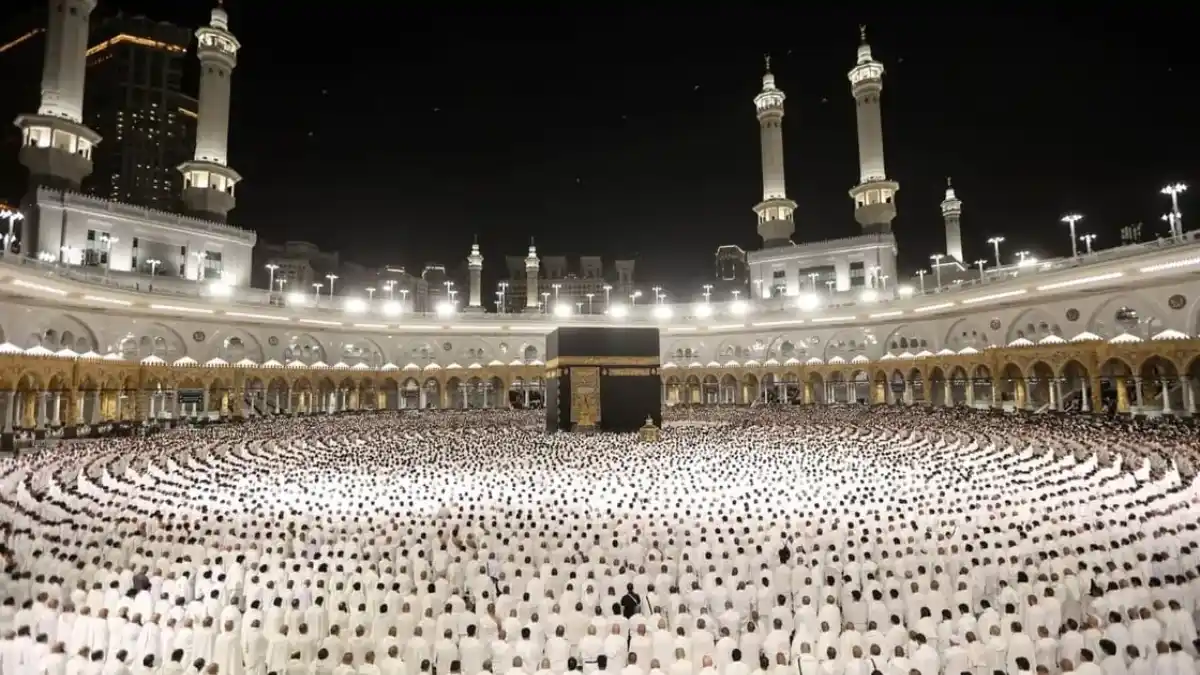Thousands of Indonesian pilgrims have returned home after completing the annual Hajj pilgrimage in Saudi Arabia, with some facing significant delays due to escalating armed conflict in the Middle East. Two groups of pilgrims from Surabaya in East Java were stranded for a day when their flights were canceled following a temporary closure of airspace in the region, a stark reminder of how geopolitical tensions can disrupt even the most sacred of journeys.
Flights Delayed by Regional Conflict
On June 23, 2025, an Iranian missile attack on the Al Udeid air force base in Doha, Qatar—reportedly in retaliation for US bombings of Iranian nuclear facilities—triggered the closure of several regional airports, including Muscat International Airport in Oman. The resulting airspace restrictions forced airlines to cancel flights, leaving hundreds of Indonesian pilgrims stranded in Jeddah, Saudi Arabia. Two groups, identified as SUB 43 and SUB 44, totaling 410 pilgrims, were initially scheduled to return on June 24 but had to wait an extra day or more in transit hotels arranged by Indonesian officials.
The first group, SUB 43 with 380 pilgrims, departed Jeddah on the evening of June 25 after a ceasefire between Iran and Israel was announced by US President Donald Trump. The second group, SUB 44 with 30 pilgrims, followed on the morning of June 26. “The [two groups] whose flights were delayed have arrived home. The pilgrims have been reuniting with their families” said Muhammad Zain, the Religious Affairs Ministry’s domestic Hajj service director, in a statement on June 28.
Religious Affairs Minister Nasaruddin Umar confirmed that the recent tensions in the Middle East affected only these two flights to Surabaya, adding that other return flights for Indonesian pilgrims are now operating smoothly. “Hopefully the ceasefire lasts until our last pilgrims return home, because they would pass over the Qatari airspace, which is safe to be passed through now” he said in Jakarta on June 29, as reported by Kompas.com.
A Challenging Year for Hajj
This year’s Hajj, a mandatory pilgrimage for able-bodied Muslims who can afford it, drew over 1.4 million participants globally, with more than 200,000 from Indonesia—the largest national contingent as allocated by the Saudi government. The pilgrimage, which involves rituals in and around Mecca, is often a deeply personal and spiritual journey, but for many Indonesian pilgrims in 2025, it was overshadowed by external disruptions.
Indonesian pilgrims were organized into 525 flight groups departing from 14 embarkation points across the archipelago, including Jakarta, Surabaya, Medan in North Sumatra, and Makassar in South Sulawesi. Their return was divided into two waves: the first from Jeddah between June 11 and 25, and the second from Madinah between June 26 and July 11. As of June 28, over 108,000 pilgrims across 280 flight groups had returned home, according to the Religious Affairs Ministry. However, 92 pilgrims remain hospitalized in Saudi Arabia, with an additional 26 receiving treatment at Indonesian Hajj clinics for various ailments.
Beyond the delays caused by the Middle East conflict, the return journey faced other hurdles. Two Saudi flights carrying pilgrims to Surabaya and Jakarta were diverted to Kualanamu International Airport in Medan on June 17 and 21 due to bomb threats. Pilgrims were forced to stay overnight while security personnel inspected the aircraft, finding no explosive devices. Authorities are still investigating the source of these false threats, which added to the anxiety of an already complex return process.
Geopolitical Backdrop and Pilgrim Safety
The escalation of conflict between Israel and Iran, compounded by US military actions in the region, has cast a long shadow over international travel in the Middle East. The temporary closure of airspace and airports like Muscat’s illustrates the broader implications of such tensions, affecting not just military and political actors but also civilians far removed from the conflict’s epicenter. For Indonesian pilgrims, most of whom save for years to undertake the Hajj, these disruptions are a harsh intrusion into a spiritual milestone.
Indonesia, as the world’s largest Muslim-majority nation, places significant emphasis on ensuring the safety and smooth passage of its pilgrims. The Religious Affairs Ministry has been working closely with Saudi authorities and local officials to manage logistics, particularly in light of the recent disruptions. Hilman Latief, the ministry’s director general for Hajj and Umrah, urged remaining pilgrims in Saudi Arabia to adhere to local regulations and follow guidance from Indonesian authorities. “We still have much to do [until July 11], so I hope all Indonesian officials are still standing at the ready, despite the number of pilgrims having decreased significantly” he said in a statement on June 28.
The ceasefire between Iran and Israel, while temporary, offers a glimmer of hope for the remaining pilgrims scheduled to return through Qatari airspace. However, the fragility of such agreements raises questions about the long-term stability of travel routes in the region. If tensions flare again, further delays or cancellations could impact the second wave of returns from Madinah, potentially stranding more pilgrims or forcing rerouting at significant cost and inconvenience.
Broader Implications for Indonesia
The disruptions faced by Indonesian pilgrims highlight the intersection of global politics and personal faith. Indonesia’s government, under pressure to protect its citizens abroad, must navigate a delicate balance between diplomatic relations with Middle Eastern nations and ensuring the welfare of its Hajj contingent. The allocation of over 200,000 slots by Saudi Arabia reflects Indonesia’s significant role in the global Muslim community, but it also underscores the logistical challenges of managing such a large group amid unpredictable international crises.
Public sentiment in Indonesia, as reflected in social media posts and local news coverage, shows a mix of relief at the safe return of many pilgrims and concern for those still in Saudi Arabia. The bomb threats, though unfounded, have fueled discussions about security protocols for international flights, with some calling for stricter measures to prevent such hoaxes. Meanwhile, the ministry’s efforts to accommodate stranded pilgrims in Jeddah hotels have been praised, though questions remain about the financial burden of such arrangements—costs that are often borne by the state or passed on to pilgrims.
Economically, the Hajj represents a significant investment for many Indonesian families, with costs often running into millions of Indonesian Rupiah per person. For instance, basic Hajj packages can cost around 35 million Rupiah (US$2,200) per pilgrim, based on exchange rates as of late June 2025, excluding additional expenses for delays or unexpected accommodations. While the government subsidizes some aspects of the pilgrimage, any prolonged disruptions could strain both individual budgets and national resources allocated to Hajj management.
Looking Ahead
As the second wave of Indonesian pilgrims prepares to depart from Madinah over the coming weeks, the specter of renewed conflict in the Middle East looms large. The temporary ceasefire offers a window of opportunity, but its durability remains uncertain. For the pilgrims still in Saudi Arabia, many of whom are elderly or managing health issues, the priority is a safe and timely return to their families.
For now, the images of returning pilgrims disembarking at airports like Sultan Iskandar Muda in Aceh province on June 28—greeted by loved ones and assisted by officials—provide a poignant contrast to the geopolitical storms unfolding thousands of miles away. Their journey, both spiritual and physical, serves as a testament to resilience in the face of challenges far beyond their control. As Indonesia continues to bring its citizens home, the hope is that peace, however fleeting, holds long enough to see the last pilgrim safely back on home soil.
















